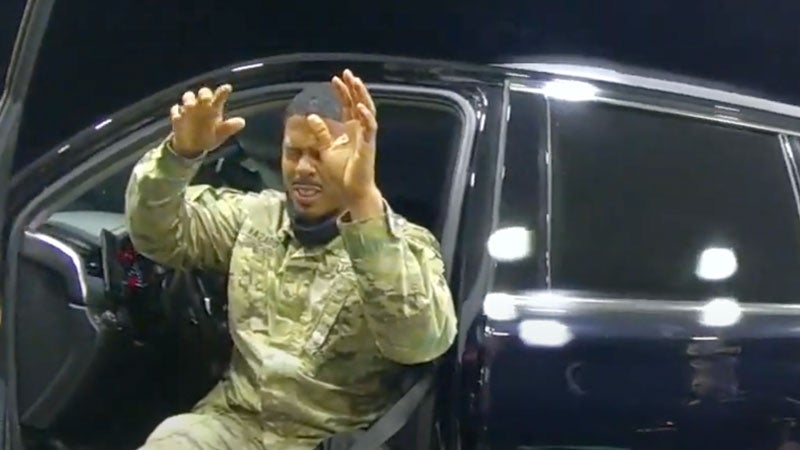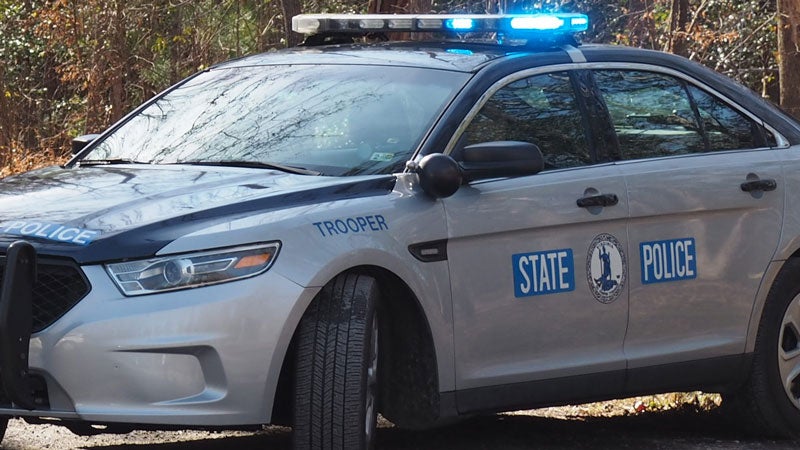Guardsman’s suit against Windsor officers headed to appeals court
Published 3:06 pm Tuesday, August 22, 2023

- Virginia National Guard 1st Lt. Caron Nazario, after being pepper-sprayed by ex-officer Joe Gutierrez, exits his car with his hands raised in this still image taken from body camera footage of the Dec. 5, 2020, traffic stop in Windsor.
The Virginia National Guardsman who sued Windsor police officers for holding him at gunpoint and pepper-spraying him during a 2020 traffic stop has appealed his case to the Fourth Circuit U.S. Court of Appeals.
1st Lt. Caron Nazario, who is of Black and Latino descent, had sought more than $1 million in damages from officers Daniel Crocker and Joe Gutierrez. The latter was fired after videos of the incident went viral online and sparked accusations of racism.
A federal jury in Richmond awarded Nazario $3,685 in January after finding Gutierrez liable for assault – but not battery – and Crocker liable for having illegally removed a firearm from Nazario’s car.
A June court filing by Nazario’s attorney, Jonathan Arthur, asks that the wildly lower-than-sought jury award be overturned. U.S. District Court Judge Roderick Young, who presided at the January trial, upped the award by only $1 in May when Arthur asked him to either increase the damages or grant Nazario a new trial.
Arthur’s filing further asks the appeals court to reconsider several pretrial rulings by Young.
The officers’ body cameras had recorded an exchange between Nazario and Gutierrez, in which the ex-officer gave Nazario a choice after forcing him out of his car.
“If you want to fight and argue … we’ll charge you,” Gutierrez said, noting charges would entail informing Nazario’s military command, or Nazario could avoid being charged if he would “chill” and “let this go.”
Nazario’s April 2021 filing of the original lawsuit had characterized the exchange as an effort to suppress Nazario’s free-speech right. The suit had also accused the officers of having “unreasonably prolonged” the traffic stop and of having used “excessive force.”
Young dismissed the three claims on Aug. 9, 2022, finding in favor of the officers’ qualified immunity defense, which shields police from most federal lawsuits. In his ruling, Young concluded Crocker had “probable cause” to pull Nazario over when he observed the Guardsman’s Chevrolet Tahoe traveling down Route 460 through Windsor, seemingly without a license plate. Gutierrez responded to the scene when Crocker reported a “felony traffic stop” to dispatchers. Nazario had a temporary, expired New York tag taped to the inside of his car’s window, but Crocker said he didn’t see it and accused Nazario of eluding police for driving roughly a mile down the four-lane highway to a BP gas station before stopping.
Nazario’s appeal seeks to reverse Young’s dismissals.
The appeal also asks the court to reconsider Young’s Dec. 22, 2022, ruling allowing an after-the-fact video created by Crocker to show the route of his pursuit of Nazario to be used “as a demonstrative aid” in the trial.
According to the U.S. Courts’ website, federal appeals typically entail each side making an oral argument – usually about 15 minutes – to a panel of judges. The panel’s decision is typically the final word on the case unless the panel remands the case back to trial court or a party asks the U.S. Supreme Court to review the case.
According to Arthur, an appellant’s opposition typically has 30 days after the initial appeal to file a response, and the appellant then gets another 21 days to respond to the opposition’s filing. Once that’s done, the court will schedule oral arguments, and eventually issue an opinion.
“All of that will depend largely on the circuit’s schedule and docket,” Arthur said. “We will know if Lt. Nazario will get a new trial once the Fourth Circuit renders its opinion.”





